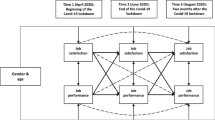Abstract
The literature on the relationship between work and family has shown that there is a spillover effect between both domains. In particular, research that has investigated the influence of home environment on work has shown that family instability affects work satisfaction and performance. This study investigates the spillover between family and work by examining the link between marital status and work performance across the three phases of marriage, divorce, and remarriage. Specifically, this article links marital status and work performance through a longitudinal analysis of a set of university teaching evaluations. A polynomial regression model was fit to the data and a cubic curve through the three periods of marriage, divorce, and remarriage was statistically significant. Implications of the study and areas for future research are discussed.
Similar content being viewed by others
References
Albrecht, S.L., Bahr, H.M., & Goodman, K.L. (1983). Divorce and Remarriage: Problems, Adaptations, and Adjustments. Westport: Greenwood.
Aleamoni, L.M. (1999). Student Rating Myths versus Research Facts from 1924 to 1998. Journal of Personnel Evaluation in Education, 13(2), 153-166.
Axelrod, S.D. (1999). Work and the Evolving Self: Theoretical and Clinical Considerations. Hillsdale, NJ: Analytic Press.
Barnett, R.C. (1994). Home-to-Work Spillover Revisited: A Study of Full-Time Employed Women in Dual-Earner Couples. Journal of Marriage and the Family, 56(3), 647-656.
Barnett, R.C., Marshall, N.L., Raudenbush, S.W., & Brennan, R.T. (1993). Gender and the Relationship Between Job Experiences and Psychological Distress: A Study of Dual-Earner Couples. Journal of Personality and Social Psychology, 64(5), 794-806.
Benin, M.H., & Nienstedt, B.C. (1985). Happiness in Single-and Dual-Earner Families: The Families of Marital Happiness, Job Satisfaction, and Life Cycle. Journal of Marriage and the Family, 47(4), 975-984.
Blair, S.L. (1998). Work Roles, Domestic Roles and Marital Quality: Perceptions of Fairness Among Dual-Earner Couples. Social Justice Research, 11(3), 313-335.
Blustein, D.L. (in press). The Interface of Work and Relationships: Critical Knowledge for 21st Century Psychology.
Blustein, D.L. (1997). A Context-Rich Perspective of Career Exploration Across the Life Roles. Career Development Quarterly, 45, 260-274.
Blustein, D.L., & Spengler, P.M. (1995). Personal Adjustment: Career Counseling and Psychotherapy. In W.B. Walsh and O.S. Osipow (Eds.), Handbook of Vocational Psychology: Theory, Research, and Practice. Hillsdale, NJ: Lawrence Earlbaum Associates, pp. 295-329.
Buunk, B.P. & Mutsaers, W. (1999). Equity Perceptions and Marital Satisfaction in Former and Current Marriage: A Study Among the Remarried. Journal of Social and Personal Relationships, 16(1), 123-132.
Chiu, R.K. (1998). Relationships Among Role Conflicts, Role Satisfactions and Life Satisfaction: Evidence from Hong Kong. Social Behavior and Personality, 26(4), 409-414.
Demo, D.H., & Acock, A.C. (1996). Singlehood, Marriage, and Remarriage: The Effects of Family Structure and Family Relationships on Mother's Well-Being. Journal of Family Issues, 17(3), 388-407.
Eagle, B.W., Icengogle, M.L., Maes, J.D., & Miles, E.W. (1998). The Importance of Employee Demographic Profiles for Understanding Experiences of Work-Family Interrole Conflicts. The Journal of Social Psychology, 138(6), 690-709.
Gaesser, D.L., & Whitbourne, S.K. (1985). Work Identity and Marital Adjustment in Blue-Collar Men. Journal of Marriage and the Family, 47(3), 747-751.
Greenhaus, J.H. (1988). The Intersection of Work and Family Roles: Individual, Interpersonal, and Organizational Issues. In E.B. Goldsmith (Ed.), Work and Family: Theory, Research, and Applications. Newbury Park: Sage, pp. 23-44.
Greenhaus, J.H., & Beutell, N.J. (1985). Sources of Conflict Between Work and Family Roles. Academy of Management Review, 10(1), 76-80.
Hope, S., Rodgers, B., and Power, C. (1999). Marital Status Transitions and Psychological Distress: Longitudinal Evidence from a National Population Sample. Psychological Medicine, 29(2), 381-389.
Huddleston, R.J., and Hawkings, L.D. (1991). The Effect of Divorce on Daily Routine. Family and Conciliation Courts Review, 29(2), 150-159.
Huitema, B. (1980). The Analysis of Covariance and Alternatives. NY: Wiley.
Pedhazur, E. (1997) (3rd ed.). Multiple Regression in Behavioral Research. NY: Harcourt.
Perrewe, P.L., Hochwarter, W.A., and Kiewitz, C. (1999). Value Attainment: An Explanation for the Negative Effects of Work-Family Conflict on Job and Life Satisfaction. Journal of Occupational Health Psychology, 4(4), 318-326.
Peterson, N., & Gonzalez, R.C. (2000). The Role of Work in People's Lives: Applied Career Counseling and Vocational Psychology. Australia: Brooks/Cole.
Ray, J. (1990). Interactional Patterns and Marital Satisfaction Among Dual-Career Couples. Journal of Independent Social Work, 4(3), 61-73.
Wheaton, B. (1990). Where Work and Family Meet: Stress Across Social Roles. In J. Eckenrode, and S. Gore (Eds.), Stress Between Work and Family: The Plenum Series on Stress and Coping, New York: Plenum, pp. 153-174.
Wachtel, H.K. (1998). Student Evaluation of College Teaching Effectiveness: A Brief Review. Assessment and Evaluation in Higher Education, 23, 191-210.
Author information
Authors and Affiliations
Rights and permissions
About this article
Cite this article
Ludlow, L.H., Alvarez-Salvat, R.M. Spillover in the Academy: Marriage Stability and Faculty Evaluations. Journal of Personnel Evaluation in Education 15, 111–119 (2001). https://doi.org/10.1023/A:1012491713023
Issue Date:
DOI: https://doi.org/10.1023/A:1012491713023




